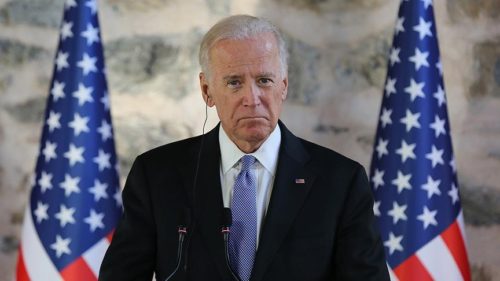
U.S. Vice President Joe Biden
Even though president-elect Joe Biden is a longtime supporter of Israel, he has expressed aims to restore support for Palestinians that was cut under the Trump administration.
So, what does this mean for Palestinians and should people have faith that Biden will reverse any of Trump’s Israeli policies? These policies failed to bring Israelis and Palestinians together and destroyed Palestinians hopes for creating a state and the right to return to their homeland.
Trump’s peace plan—planned by Trump’s son-in-law and senior adviser Jared Kushner—has not brought peace to Israel/Palestine, but it has given Israeli Prime Minister Benjamin Netanyahu the green light to apply sovereignty to settlements on Palestinian territory and gave Netanyahu the permission to do whatever he pleases without any reconsideration or respect for the Palestinians struggle for freedom.
Even during the Obama administration, the U.S led talks with the Palestinians stalled over Israeli policies on expanding Jewish settlement and Israeli policies in East Jerusalem. Israeli policies were a constant source of tension between the Israeli government, headed by Netanyahu and former president Barack Obama’s administration and European allies.
Moving the U.S. embassy to Jerusalem was one of the major efforts that Trump’s administration has accomplished in the peace deal. Many Christian Americans (particularly Evangelicals) believe that Jerusalem should belong to Jews in order to fulfil one of their biblical prophecies of Armageddon.
According to Support For President Trump’s Decision To Recognize Jerusalem As Israel’s Capital, released by the White House, Mike Rogers expressed his joyfulness to move the embassy to Jerusalem saying that as a Christian, “we’re dedicated” to Israel’s security and freedom, and Israel is sacred to many Americans. He embraced Trump’s action saying that “past presidents used words on this subject, Trump uses action.”
Palestinians should not object to the U.S policies concerning their lives and futures and are simply forced to accept the status quo. According to Noura Erakat, a human rights attorney and assistant professor at Rutgers University, moving the embassy from Tel Aviv to Jerusalem affects Palestinians living in East Jerusalem, and this action will be built on the steady uprooting of the city’s Palestinian population through forced removal, residency revocation, and the denial of permits for Palestinian family reunification. Palestinians make 40 percent of Jerusalem’s population and the majority are not Israeli citizens and are not eligible to vote in Knesset elections.
However, when Biden takes office in January, Israel will no longer secure the same treatment that it received throughout Trump’s presidency. President-elect Joe Biden was clear during his campaign that there would be no future peace deals without the Palestinians, and he will work on bringing the two sides together toward a two-state solution.
According to an article written by Natasha Turak for CNBC in November, vice president-elect Kamala Harris, an adamant supporter of Israel, said that the new administration will take “immediate steps to restore economic and humanitarian assistance to the Palestinian people, address the ongoing humanitarian crisis in Gaza, reopen the U.S. consulate in East Jerusalem, and work to reopen the PLO mission in Washington.”
It is obvious that Biden is unlikely to reverse the decision on moving the embassy. But Palestinians are somehow optimistic about Biden, hoping that he will restore their relationship with the U.S. However, Palestinians know that he cannot be the solution for their problems but at least he will give them some acknowledgment.
“Palestinians understand the election of Joe Biden is not panacea that will ensure Palestinian freedom,” Noura Erakat said. “As disastrous as the Trump administration has been for viable Palestinian futures—and it has been quite disastrous—the policies just represented an acceleration of mainstream U.S. positions in the region, rather than a departure from them.”







